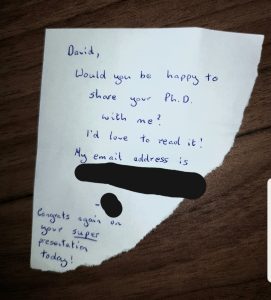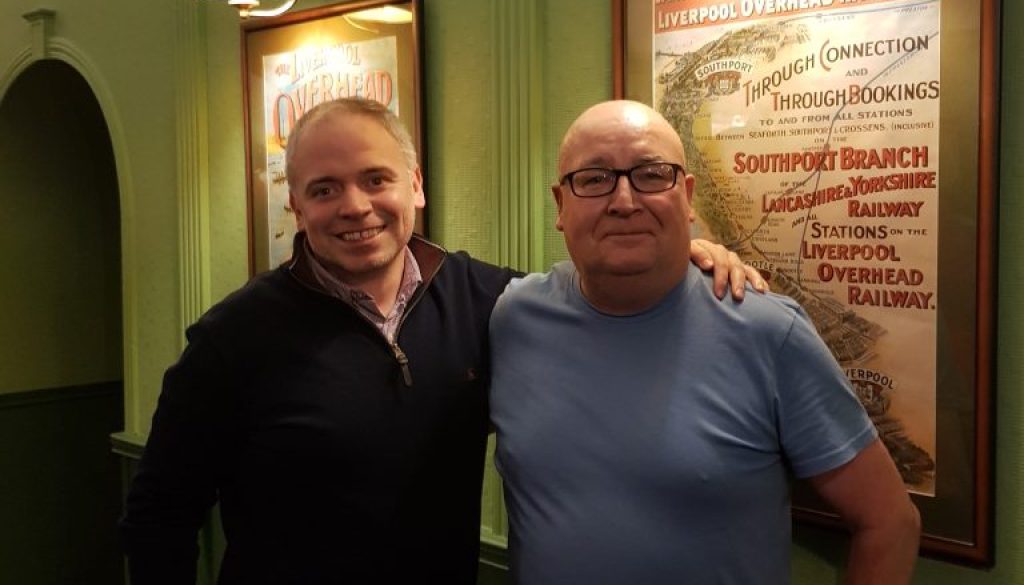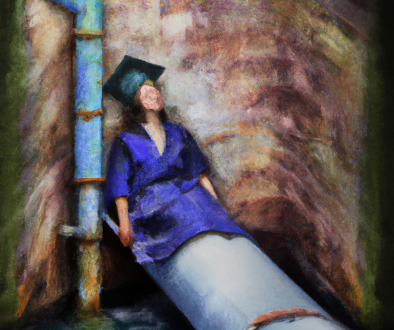Welcome to Warsaw – by David Crighton
Shamelessly eavesdropping in a Manchester Airport café, I heard a man in his early 20s talking about his job as a social media influencer. Although he has a million followers and can demonstrate income from advertising revenue (and his clothing brand), he’s struggling to get a mortgage given the instability of the ‘profession’. The idea of making a living by commodifying your personal life seems bizarre me. But, ironically, were there parallels with what I was doing?
I was heading to Warsaw to present at my first international conference and I was doing this six days in advance of my doctoral viva examination. Both crucial steps to ‘get on‘ in academia, although in undertaking these I feel like I’ve been stumbling around in the dark looking for a light switch. I’m still not sure what I’m doing in this academic world. After the initial invite to present, I didn’t hear from the organisers for two weeks, I was terrified they’d asked me by mistake and that I’d subsequently conned work into paying for a trip away. The relief when they sent the programme was palpable, as I was increasingly embarrassed at the thought of having to pay work back! Relax, your name is on the list- serious imposter syndrome.

My dad, who’s been a fitter, publican, loft insulator, installer of lead windows, and a bus driver, couldn’t quite grasp the idea of me speaking at a conference in Warsaw as part of my job. It seems as intangible to him as employment via social influencing seems to me. When telling my mum, over the phone, that I’d been invited to go over there she instantly relayed the news to my dad who, off stage, I could hear reply “what do they want to listen to him for?” The reaction was neither a joke or a put down. He genuinely couldn’t understand why I was travelling 1500 miles to talk to a room full of people and how this fitted with my job. Just as I couldn’t understand how the influencer could sell underpants (genuinely, he was trying to flog boxies) off the back of a few thousand Instagram ‘likes’. The second irony lays in the fact that my research partially looks at the ways academics are often commodified (see Page, 2020 for more on this) and presenting at such things is one way of metaphorically selling your own brand of undies.
After a long day of travel, which included a layover in Frankfurt, I dumped my bags and went straight to the pub. It’s my natural instinct when exploring a new city, it’s done through the lens of pubs. The first place I walked into had pictures of The Beatles on the wall, a Liver Bird plaque and various pictures of Liverpool dotted around. After ordering a pint the barman enquiries, in my native scouse tongue, “where in Liverpool are you from?” It turns out that before moving to Poland in 1997, bar owner Graham had lived on Zig Zag Road, a two-minute walk from my family home where my mum and dad still live to this day. This road is memorable to me for two reasons, firstly it was on my paper round. Secondly, it is the road I gave as a false address after receiving a serious admonishment from the caretaker, for climbing on the school roof during a particularly uneventful day during a typically uninspiring summer holiday. Back to Graham’s bar, I loved it. I was made to feel incredibly welcome by all the other punters, mainly ex-pats, who wanted to share stories about football and how they ended up living in Poland. It took my mind off the nerves, I was terrified about having to present.
I was incredibly nervous on day 1 of the conference and I wasn’t speaking until day 2! I walked around the beautiful campus in Warsaw several times, trying to delay going inside and putting a face to my name on the schedule: David Crighton – Wrexham University – Surviving in the Toxic University: exploring neoliberalism ‘out there’ and ‘in here’ with English higher education lecturers. It turns out Wrexham is quite the pull these days, with the Hollywood takeover of Wrexham FC by Ryan Reynolds and the other fella, and their accompanying documentary on Disney+, Welcome to Wrexham! My first encounter with a peer provided a bittersweet moment. “You’re the guy from Wrexham, I love the documentary, I’ve been looking forward to speaking with you about it!”, so far so good, my tension levels drop considerably and I’m feeling like ‘I can do this!’. Then my faux pas…
We unpicked the documentary a little and I follow up with an enquiry as to which team my newfound friend supports, the sharp response threw me “I think a common mistake people make is assuming that everybody likes football, I do not! I have never supported a football team in my life”. It felt like a dressing down and, against my instinct, I resist the urge to volunteer that I live at number Zig Zag Road for a second time in my life in the hope it’ll get me out of an uncomfortable squeeze.
This was the first of many conversations I had about ‘Welcome to Wrexham’ but I subsequently made sure other discussions were held on an anthropological level, giving off the type of smile that gives me a headache when in an uncomfortable situation. It made me cringe inside with each passing dissection of working-class life through the lens of football, offered by others. I like the TV show as much as the next person, it is heart-warming, but it is not untypical of what football is like in any other UK city. I’ve been an Everton season ticket holder since 1992, I go the game with family and friends, I’ve been to Everton in the Community Projects with my son and I know how big a part football plays in communities they serve (EiTC, they do all sorts. Watching the dissection at arm’s length was, at times, uncomfortable. One thing was for certain, I was definitely no longer in Graham’s bar and this all served to make me a nervous wreck the day before my presentation.
The following day I couldn’t eat. I drank lots of coffee and water, I wanted to be hydrated and alert but this just necessitated frequent trips to the toilet. The closer I got to my 2.15pm presentation slot the more I zoned out of the room. The lunch break before my talk seemed to last an eternity, I paced the campus taking in as much cold air as possible, as the snow fell heavy on and around me. I just wanted to get in and get it over with. Why was I putting myself through this? A few days before my exam, this was stress I simply didn’t need. In that moment, I wanted to be anywhere else.
When I was invited up to speak, the nerves disappeared, a kind of auto-pilot took over (probably resulting from my weeks of viva prep). Before I left for the conference my dad’s words of encouragement were ‘get in there and get stuck in’, a comforting mantra he often uses as shorthand for giving it your best, ringing in my ears as I made my way to the front. So, I did. I spoke passionately about the challenges faced by the participants in my study, to my own surprise it boomed out of me. The applause at the end was warm, the questions were very helpful and supportive, and I had done it. It wasn’t that bad, why had I tortured myself?
I got back to my chair and the relief was incredible, I’d held my own and got stuck in, in a space in which I felt unfamiliar and uncomfortable. During the break a few people thanked me for my talk and continued the conversation in a supportive and constructive way. Later that afternoon, another attendee dropped me a note to ask whether they could get a copy of my thesis to read, which also offered more kind words about my talk. That simple act of interest and kindness really moved me, gave me confidence ahead of my exam and will be one of my abiding memories of the trip.

Later that evening, and back at Graham’s bar, the locals who I had only known for a day and a bit were all enthusiastic in asking me how it had gone at the conference. I was touched they’d even remembered to ask. I told them it had gone pretty well, then our attention turned back to gabbing away as if we’d known each other for years.
For those wondering… I passed the viva, without amendments. Celebrating back in Liverpool with friends by going to watch a Smiths tribute band (The Smyths- well worth checking out) that we’d had pencilled in for months. They admitted to having no idea what I’d been working on but were ‘dead proud’ all the same. Will that week-long stress hold me in better stead next time I force myself to engage in these spaces? Probably not, but I’ll ‘get stuck in’ regardless of what comes next.
References
EiTC. (2023). What we do. [Online]. Everton in the Community. Last Updated: ND. Available at: https://www.evertoninthecommunity.org/ [Accessed 29 November 2023].
Page, D. (2020). The academic as consumed and consumer. Journal of Education Policy, 35(5), 585-601.

